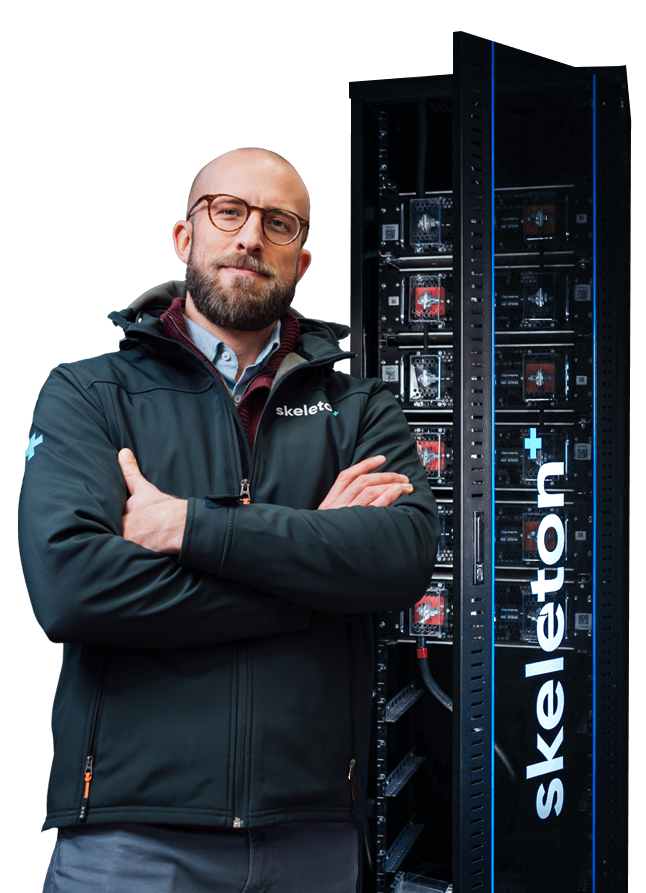
Patricia Godel: deeptech companies can't bridge the dreaded valley of death during scaling without public funding

Skeleton Technologies' Head of Grant Financing and Risk Patricia Godel explains why the smart offering of public funding instruments is more important than ever before and why innovation in Europe is at risk.
Why is public funding important for scale-ups like Skeleton?
Public funding is an invaluable tool for financing innovative green tech scale-ups like Skeleton. This way companies that act in the common interest of humankind get financial support to succeed in introducing innovative and sustainable technologies to the market. We help to save energy and hence CO2 emissions, even in segments that nobody dares to touch, such as mining.
Skeleton’s great asset is innovation. We are not just living off one good idea that someone had decades ago, we are constantly figuring out new ways to store energy, make our products better, find new applications, and - last but not least - scale up something that has never been mass-produced before. This is how we can take on the big problems of climate change, energy security, and raw material scarcity.
This is how we can take on the big problems of climate change, energy security, and raw material scarcity.
Innovation is always risky, things can go wrong even with the best of preparation and intention. That is why it is innovation. More often than not, we take a calculated risk to try something that might not work out. With public funding, we can mitigate that risk and allow the Technology and Engineering teams to push boundaries.
As a scale-up, this is particularly important for us because we scale with the help of investors and they have more confidence in companies that have been vetted by public funding authorities. Being well-financed by public money allows businesses to attract private investment.
What kind of state aid instruments are there around for companies like Skeleton?
Public funding can support a wide range of activities, but generally, there are three types.
Firstly, for early-stage research To develop a new technology or understand the faults and limitations of our products, we undertake early-stage research. We often do this kind of project as part of a consortium to include the know-how of research organizations and other companies. Both Estonia and Germany have some good instruments for funding these sorts of projects and the EU gives out Horizon Europe grants for this work.
Secondly, for later-stage development. These are projects we undertake to transform an existing technology into an actual product or to find new fields of application and new implementation strategies. This still requires significant innovation because getting something from working in the lab to working in a larger context is very difficult – especially when chemistry is involved. We usually turn to EU programmes to support those projects.
Innovation, research, and development continue to be needed throughout the scale-up phase.
Thirdly, for large scale-up projects. Both the individual states and the EU are interested in seeing R&D turned into successful products, especially when it comes to the energy sector. The difficulty is that scaling up does not mean that the innovation ends, especially for a deep tech company like us. In fact, innovation, research, and development continue to be needed throughout the scale-up phase. The EUBATIN (European Battery Innovation) project we’re currently implementing in Germany has exactly that integration of scaling and innovation as well as a wide network of companies for knowledge exchange. It is financed by the German Federal government and the State of Saxony.
What makes the EUBATIN framework significant?
EUBATIN is an IPCEI project, where IPCEI stands for “Important project of common European interest”. The EU and the member states have set up the IPCEI programme to support strategically important industries and strengthen them within Europe.
Earlier programmes have often relied on an artificial separation of research, development, and scaling that was based on a very traditional understanding of industry. However, when it comes to deep tech and knowledge-based industries, such separation doesn’t make sense and the IPCEI with its different phases is acknowledging that. There, a research phase goes over into a phase of first industrial deployment, where innovation is carried through from the lab to the shop floor.
Earlier programmes have often relied on an artificial separation of research, development, and scaling.
That is the great advantage of the IPCEI framework for industries like ours. Continuing it for knowledge-intensive fields could be highly beneficial and it might even replace some of the more outdated programmes that give companies and member states less flexibility to react to fast-moving global challenges.
What kind of vital state aid is still missing?
Generally speaking, there’s much less public funding for scale-ups compared to start-ups or other smaller companies. Skeleton is one of the few companies at the scale-up stage that has been able to win an IPCEI grant. Often, the financiers argue that at the scale-up stage, private investment should take the place of public funds. In my view, this approach misses the opportunity that a public-private partnership in this area could provide.
Stronger inclusion of private investors into the public funding process, especially on larger scales, could ease the risk of investors.
The EIC Accelerator programme, with its blended financing approach, is a step in the right direction, offering both grant and equity financing. Stronger inclusion of private investors into the public funding process, especially on larger scales, could ease the risk of investors and help younger companies bridge the dreaded valley of death during scaling, where capital expenditure (CaPex) heavy industries often require hundreds of millions of euros.
How has the situation changed in the last few years? How have the companies` needs changed and how are we doing in Europe in global comparison?
The last few years have been turbulent. Many young companies have not survived, and this process is not over yet. This might not be a bad thing in every case, it is important that the global business climate does not harm the rise of innovative younger companies that tackle societally important challenges.
Markets already react to incentives set by governments outside of Europe.
In particular, with individual countries globally becoming more protective of their internal economies, both the EU and the individual member states must react to keep the playing field level. We can already see the impact of the US Inflation Reduction Act on global markets. Europe needs to act quickly to avoid negative effects that might harm the successes of programmes such as the IPCEI. This could mean an expansion of existing programmes or the speedy adaption of new instruments, but time is certainly of the essence, as markets already react to incentives set by governments outside of Europe. This puts European innovations at risk because others are faster, not better.





